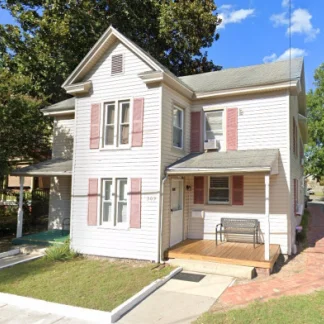Willis W Hudson Center
Willis W Hudson Center provides the tools of recovery to individuals and familie...
Second Wind offers inpatient treatment for individuals with alcohol and/or substance addiction. The program includes 12-Step Programs, family support, group therapy and more. Second Wind is located at Salisbury, Maryland.
Second Wind was incorporated in 1971 and admitted their first resident in 1972. They are compromised to provide a safe, drug and alcohol free environment for men in early recovery seeking to learn to live clean and sober. Using both reality therapy and cognitive behavioral therapy, the Executive Director,case manager, and housing managers are committed to the patient’s recovery process.
Located in Salisbury, on the Eastern Shore of Maryland, Second Wind is a 7 bed halfway house program for men seeking a structured, supportive living situation during a 28 day inpatient stay. Supported by a state grant, Second Wind follows the ASAM Criteria for level III.1.
They provide treatment planning,individual and group counseling; 2 in a room housing; a cook making nutritious dinners Monday through Friday.
Contact us for more information: (410) 749-8038

Connect with Second Wind by calling their admissions team directly.
(410) 749-8038 Website Get DirectionsResearch clearly demonstrates that recovery is far more successful and sustainable when loved ones like family members participate in rehab and substance abuse treatment. Genetic factors may be at play when it comes to drug and alcohol addiction, as well as mental health issues. Family dynamics often play a critical role in addiction triggers, and if properly educated, family members can be a strong source of support when it comes to rehabilitation.
Group therapy is any therapeutic work that happens in a group (not one-on-one). There are a number of different group therapy modalities, including support groups, experiential therapy, psycho-education, and more. Group therapy involves treatment as well as processing interaction between group members.
In individual therapy, a patient meets one-on-one with a trained psychologist or counselor. Therapy is a pivotal part of effective substance abuse treatment, as it often covers root causes of addiction, including challenges faced by the patient in their social, family, and work/school life.
Recreational therapy (aka therapeutic recreation) uses creative and fun activities to help with addiction recovery. Recreational therapists lead patients in entertaining and engaging activities like sports or games; art (drawing, painting, sculpture); drama, music, and dance; and/or community outings (field trips) to improve patients' physical, social, and emotional well-being.
Group therapy is any therapeutic work that happens in a group (not one-on-one). There are a number of different group therapy modalities, including support groups, experiential therapy, psycho-education, and more. Group therapy involves treatment as well as processing interaction between group members.
In individual therapy, a patient meets one-on-one with a trained psychologist or counselor. Therapy is a pivotal part of effective substance abuse treatment, as it often covers root causes of addiction, including challenges faced by the patient in their social, family, and work/school life.
Recreational therapy (aka therapeutic recreation) uses creative and fun activities to help with addiction recovery. Recreational therapists lead patients in entertaining and engaging activities like sports or games; art (drawing, painting, sculpture); drama, music, and dance; and/or community outings (field trips) to improve patients' physical, social, and emotional well-being.
In individual therapy, a patient meets one-on-one with a trained psychologist or counselor. Therapy is a pivotal part of effective substance abuse treatment, as it often covers root causes of addiction, including challenges faced by the patient in their social, family, and work/school life.
Recreational therapy (aka therapeutic recreation) uses creative and fun activities to help with addiction recovery. Recreational therapists lead patients in entertaining and engaging activities like sports or games; art (drawing, painting, sculpture); drama, music, and dance; and/or community outings (field trips) to improve patients' physical, social, and emotional well-being.
Recreational therapy (aka therapeutic recreation) uses creative and fun activities to help with addiction recovery. Recreational therapists lead patients in entertaining and engaging activities like sports or games; art (drawing, painting, sculpture); drama, music, and dance; and/or community outings (field trips) to improve patients' physical, social, and emotional well-being.
Willis W Hudson Center provides the tools of recovery to individuals and familie...
Hudson Health Services - Broad Street Halfway House is located in Salisbury, Mic...
Community Behavioral Health is a private rehab located in Salisbury, Maryland. C...
Three Lower County Community Services is a private rehab located in Salisbury, M...